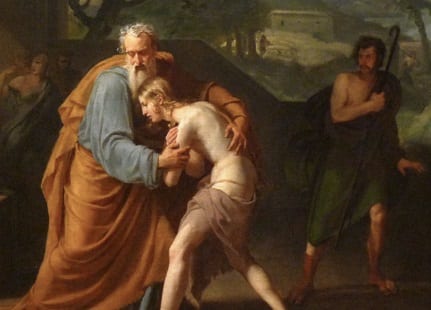
The Gospel of Luke presents three parables of what was once lost but was later found: the parables of the lost sheep (Luke 15:1–7, Matthew 18:12–14), the lost coin (Luke 15:8–10) and the prodigal son (Luke 15:11–32). Three parables which are similar and yet different in some ways. The reason I point out these similarities and differences is so that they may be used as points of reflection.
All three parables are similar in the sense that what had been lost was eventually found. Another similarity is the great rejoicing of the persons when what they had lost was found. On the other hand, the thing lost was different in each parable – a lost animal, a lost object and a lost person. Another striking difference is that in the first two parables, the owner went out to seek what was lost; whereas in the third parable, it was the lost son who returned to his father.
All things considered, these three parables give us an insight on the mind of God and the ways of God. The lost sheep, the lost coin and the prodigal son all represent the sinner who had lost his way and was separated from God. The first two parables illustrate the loving God who searches out the sinner until he is found. Ezekiel 34 says that God seeks out His sheep and the lost (vv. 11, 16). On the other hand, the parable of the prodigal son illustrates how God patiently waits for the sinner to return to Him.
So, why doesn’t God just seek out all sinners and force them to return to Him? Why does God wait for the sinner to do it? In the same way, why doesn’t God force people to believe in Him? Or to love Him?
The main reason is that God gave each person a free will for them to make the decision to love God or not to love God, to be with God or not to be with God. God does not force anyone to choose Him. The Book of Sirach says that “God in the beginning created human beings and made them subject to their own free choice.” (Sirach 15:14) The Catechism of the Catholic Church explains this as follows: “God created man a rational being, conferring on him the dignity of a person who can initiate and control his own actions. God willed that man should be left in the hand of his own counsel, so that he might of his own accord seek his Creator and freely attain his full and blessed perfection by cleaving to him.” (CCC 1730)
Even in the parables of the lost sheep and the lost coin, the point was not to show that God seeks those who are lost only to force His holy will upon them; but rather to illustrate the great love of God who goes through great lengths so that the sinner may be reunited with Him. It is in the parable of the prodigal son, we can see how the sinner finally accepted the grace of God when the son realized his wrongdoing and decided to return to his father.
But the parable of the prodigal son was not just about the sinner, but also about the self-righteous. The older brother disdained his brother because their father so readily forgave him. We may not notice it, but anytime we compare ourselves with others like the older brother, we are being self-righteous. Or, we could be self-righteous in more subtle situations – like anytime we look over our shoulders and disdain those who we think get more than they deserve. Jesus said, “Stop judging, that you may not be judged. For as you judge, so will you be judged, and the measure with which you measure will be measured out to you.” (Matthew 7:1-2) St. Paul had more scathing words to the self-righteous: “You are without excuse, every one of you who passes judgment. For by the standard by which you judge another you condemn yourself, since you, the judge, do the very same things.” (Romans 2:1)
The Gospel of Luke does not tell us if the older brother changed his heart and joined the feast. But the epilogue of the parable of the prodigal son has been played out by repentant sinners. In his first letter to Timothy, St. Paul openly talks about his sin. He was a Pharisee who, thinking that he was right, judged the Christians to be wrong and therefore sought them out to persecute them. However, he later realized that he was the one who was wrong and repented of his sin. This same epilogue has been played by converts and repentant sinners in many times and places.
Let us beware of the sin of self-righteousness; it makes us even more lost than the lost ones whom we have judged!